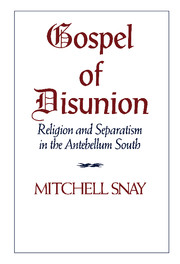Book contents
- Frontmatter
- Contents
- Acknowledgments
- Introduction: Religion and the search for Southern distinctivenes
- PART ONE RELIGION AND SECTIONAL POLITICS
- PART TWO RELIGION AND SLAVERY
- 2 Slavery defended: The morality of slavery and the infidelity of abolitionism
- 3 Slavery sanctified: The slaveholding ethic and the religious mission to the slaves
- PART THREE RELIGION AND SEPARATISM
- Conclusion: Religion, the origins of Southern nationalism, and the coming of the Civil War
- Bibliography
- Index
2 - Slavery defended: The morality of slavery and the infidelity of abolitionism
from PART TWO - RELIGION AND SLAVERY
Published online by Cambridge University Press: 07 September 2010
- Frontmatter
- Contents
- Acknowledgments
- Introduction: Religion and the search for Southern distinctivenes
- PART ONE RELIGION AND SECTIONAL POLITICS
- PART TWO RELIGION AND SLAVERY
- 2 Slavery defended: The morality of slavery and the infidelity of abolitionism
- 3 Slavery sanctified: The slaveholding ethic and the religious mission to the slaves
- PART THREE RELIGION AND SEPARATISM
- Conclusion: Religion, the origins of Southern nationalism, and the coming of the Civil War
- Bibliography
- Index
Summary
On a lazy Sunday afternoon in New Orleans, Marie St. Clare, the fictional slaveholding mistress from Harriet Beecher Stowe's Uncle Tom's Cabin, sits down to dinner after returning from church. She describes to St. Clare and Miss Ophelia, their Vermont cousin, the “splendid sermon” she had heard:
The text was, “He hath made everything beautiful in its season;” and he showed how all the orders and distinction in society came from God; and that it was so appropriate, you know, and beautiful that some were born to rule and some to serve, and all that, you know; and he applied it so well to all this ridiculous fuss that is made about slavery, and he proved distinctly that the Bible was on our side, and supported all our institutions so convincingly.
Stowe's readers, whether antislavery Northerners or proslavery Southerners, would have recognized in this passage a fundamental fact of the antebellum sectional controversy – that the Southern church was usually a bulwark of slavery. From the 1830s through the secession crisis, religion took on a major role in the proslavery crusade. When Northern abolitionists contended that slavery per se was a sin, Southern clergymen responded that the institution was a moral one. In response to this antislavery attack, Southern clerics forged an impregnable union between religion, morality, and slavery.
Proslavery Christianity occupies a pivotal place in this study. It illuminates two themes that shaped the relationship between religion and the development of Southern separatism.
- Type
- Chapter
- Information
- Gospel of DisunionReligion and Separatism in the Antebellum South, pp. 53 - 77Publisher: Cambridge University PressPrint publication year: 1993

